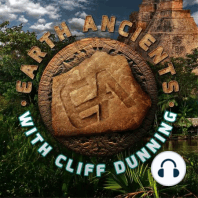86 min listen
James Martin: Uncharted, Voyages to the Americas Before Columbus
FromEarth Ancients
ratings:
Length:
101 minutes
Released:
Sep 2, 2023
Format:
Podcast episode
Description
An exploration of the history, mythology, and evidence of those who traveled to pre-Columbian America.Native groups have lived in the Americas for more than 10,000 years, but the voyages of Columbus surely did not bring the first visitors. Uncharted covers a range of cultures who seemingly visited the Americas long before Columbus, including Egyptians, Greeks, Celts, Vikings, as well as various people from Asia; and one large Chinese group who likely settled in the Americas in 100 BC. Wallace-Murphy and Martin delve into a wealth of evidence and stories, from potential Roman and Phoenician shipwrecks off the coast of South America to Celtic and Norse exploration of North America.How did the Knights Templar influence the discovery of the New World? How did the Vikings navigate their way? What do the Sinclair family, the Rosslyn Chapel, and two Venetian brothers have to do with the discovery of a new continent? With source materials dating back through millennia, including very recent finds, this book will present a side of history still so readily dismissed by some.Columbus should be remembered, but remembered for the conquering tyrant he was. These other groups did not come to conquer, but to trade, explore, and escape.Tim Wallace-Murphy (1930–2019) studied medicine at University College, Dublin, and then qualified as a psychologist; he later became an author, lecturer, and historian. He has written more than a dozen books, including The Mark of the Beast (with Trevor Ravenscroft), Rex Deus, and Rosslyn: Guardian of the Secrets of the Holy Grail. This last book provided invaluable source material to Dan Brown for his bestselling novel The Da Vinci Code.James Martin is a British historian, economist, and lecturer. James has previously worked in finance and employment law, and is presently a lecturer in further and higher education. He has dedicated a large portion of his more recent life to research into the Knights Templar, the Roman Empire, and the Western traditions of spirituality.This show is part of the Spreaker Prime Network, if you are interested in advertising on this podcast, contact us at https://www.spreaker.com/show/2790919/advertisement
Released:
Sep 2, 2023
Format:
Podcast episode
Titles in the series (100)
Mike Bara: The Ancient Earth/Mars Connection: Mike Bara is a New York Times Bestselling author, lecturer and TV personality. He began his writing career after spending more than 25 years as an engineering consultant for major aerospace companies, where he was a card-carrying member of the... by Earth Ancients
